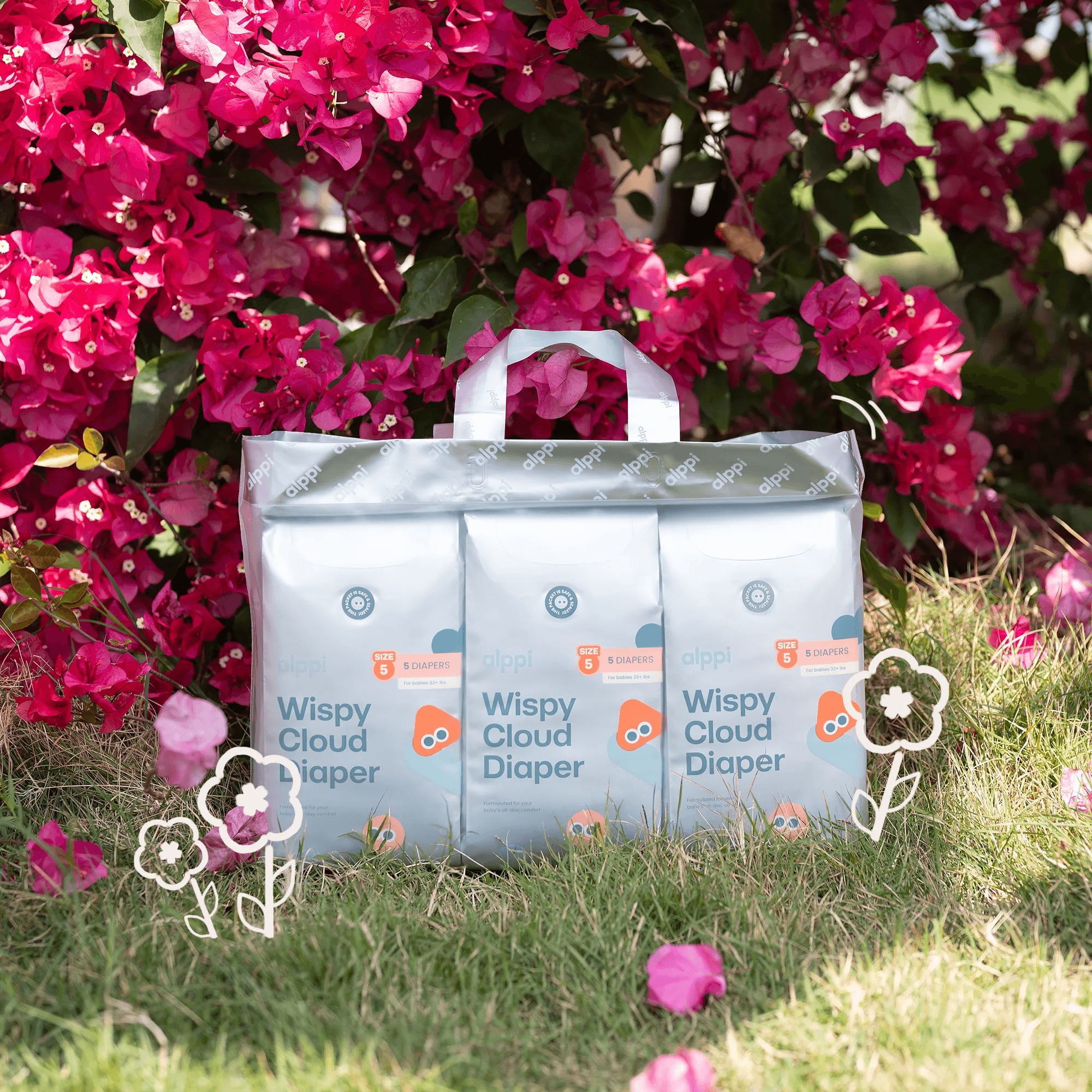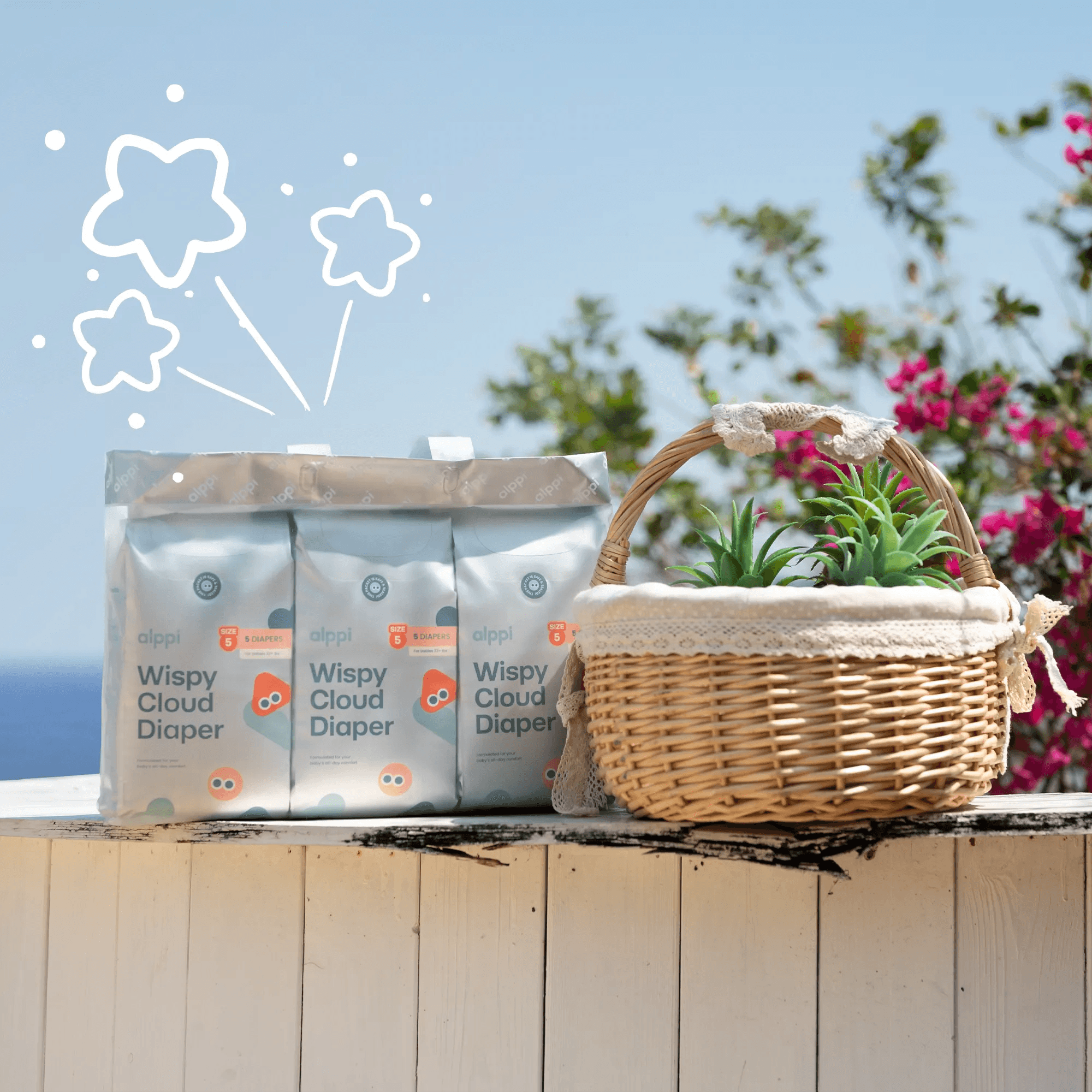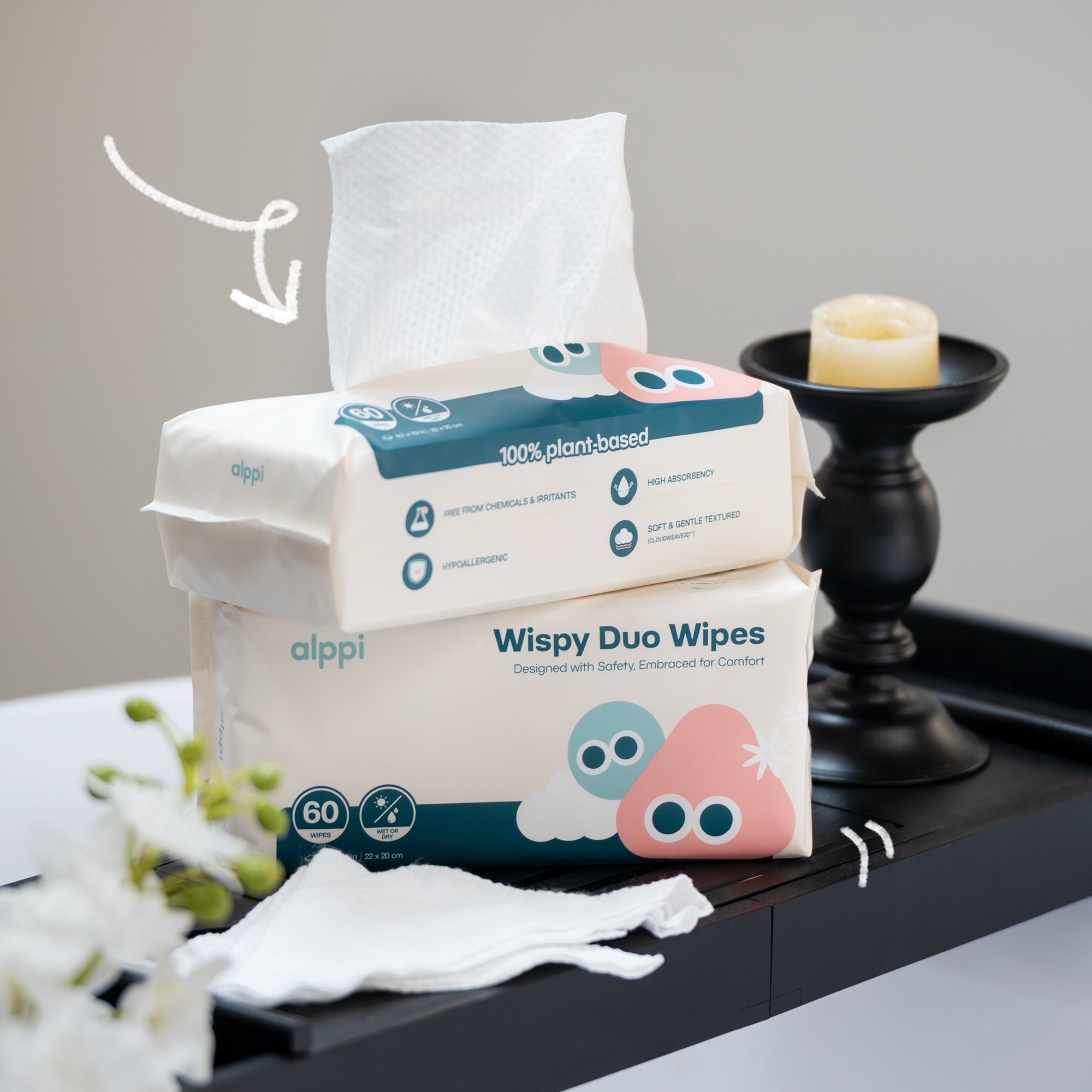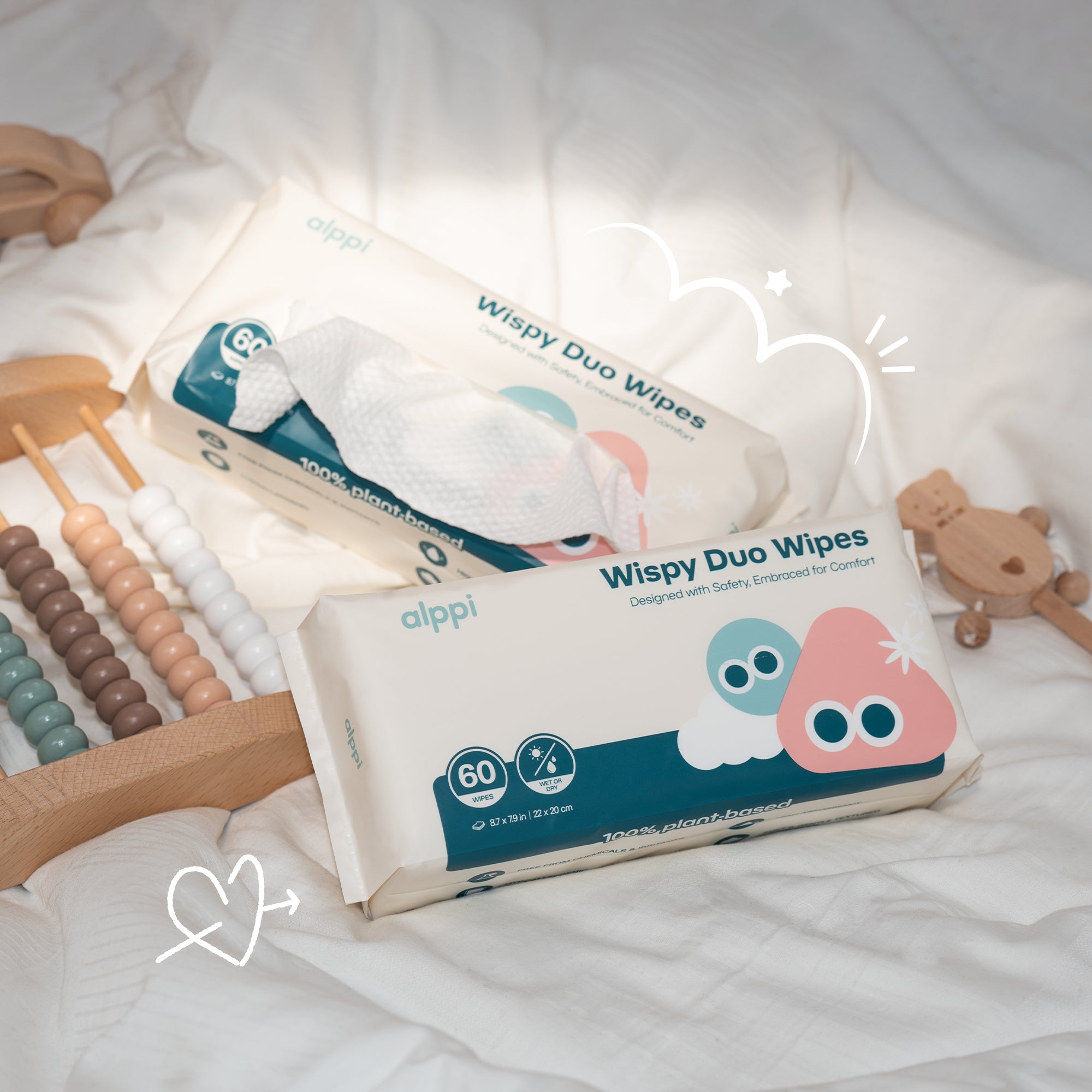Finding green poop in your baby's diaper can be alarming for any parent. You might wonder if something is seriously wrong or if you need to rush to the doctor right away.
Green poop in babies is usually normal and happens because of bile moving through their digestive system too quickly, changes in feeding, or foods they eat. The color often comes from natural bile salts, iron in formula, or green vegetables once your baby starts eating solids.
Most cases of green stool in babies resolve on their own without treatment. However, knowing when green poop signals a minor issue versus when to call your pediatrician can give you peace of mind and help keep your baby healthy.
This guide addresses "What does green poop mean in babies?" We'll cover common, harmless causes and when to consult your pediatrician.
Quick Takeaways:
- For Breastfed Babies: Often a sign of a foremilk/hindmilk imbalance, meaning the baby is getting more of the watery first milk and less of the fatty hindmilk.
- For Formula-Fed Babies: The iron fortification in most baby formulas is a very common cause of dark green stool.
- Mom's Diet: What a breastfeeding mom eats (like green leafy vegetables) can affect the color of her baby’s poop.
- Introducing Solids: Green foods like pureed peas, spinach, and beans will naturally result in green poop.
- Tummy Upset: A minor stomach bug or food sensitivity can speed up digestion, causing a green tint.
You May Want To Shop:

|
Stop running out of diapers! Sign up for the Alppi Wispy Cloud Diaper Monthly Box and get cloud-like comfort and all-day dryness delivered easily to your door. SAVE BIG NOW: Get 15% OFF your first box with FREE shipping! Just use code [ ALP15 ] at checkout. |
What Does Green Poop Mean in Newborns (0–1 Month)?
Green poop in newborns is usually normal during their first month of life. Your baby's first stools will be dark green, and you'll see color changes as their digestive system adjusts to milk feeding.
Meconium Is Normally Dark Green
Your newborn's first poop is called meconium. This sticky, tar-like stool is dark green to black in color.
Meconium forms while your baby is still in the womb. It contains things like skin cells, hair, and fluid that your baby swallowed before birth.
You should expect to see meconium for the first 2-3 days after birth. Green poop on day three of life is normal for newborns.
What you should do:
- Track wet diapers to make sure your baby is getting enough milk
- Count feeding sessions
- Watch your baby's overall behavior and energy
If your baby is feeding well and having wet diapers, the dark green meconium is nothing to worry about.
Transition Stools After Milk Comes In
After meconium passes, your baby's poop will start changing colors. This happens around day 3-5 when your milk supply increases.
The shift from meconium to regular stool can sometimes result in greenish hues during this transition period. You might see green, brown, or yellow-green stools.
These transition stools indicate that your baby's digestive system is beginning to function with breast milk or formula. The color change is a good sign that feeding is going well.
Normal transition stool colors:
- Dark green (early transition)
- Brown-green mix
- Yellow-green
- Mustard yellow (final color for breastfed babies)
What you should monitor:
- Your baby feeds regularly
- Wet diapers happen every few hours
- Your baby seems content after eating
If your baby is feeding well and has normal wet diapers, simply keep watching the diaper changes. The green color should fade as their system fully adjusts.
📌Also Read: 5 Best Diapers for Babies with Sensitive Skin
What Does Green Poop Mean in Breastfed Babies?
Green poop in breastfed babies often comes from feeding patterns, what you eat, or minor illnesses. These causes are usually normal and fix themselves with small changes to feeding or time.
Foremilk/Hindmilk Imbalance
Your breast makes two types of milk during each feeding session. Foremilk comes first and has more sugar and less fat. Hindmilk comes later and has more fat and calories.
When your baby gets too much foremilk, their poop can turn bright green and look frothy. This happens because the extra sugar moves through their system too fast. Green poop from not getting enough hindmilk often comes with gas and fussiness.
Common signs of foremilk/hindmilk imbalance:
- Bright green, foamy poop
- Baby seems hungry soon after feeding
- Lots of gas and fussiness
- Frequent, watery stools
What you can do:
- Let your baby finish one breast completely before switching
- Watch their latch to make sure they're getting deep milk
- If you have too much milk, try feeding from one side per session
Mom's Diet & Supplements
What you eat and drink can change your baby's poop color through your breast milk. Green foods like spinach, broccoli, or green smoothies can tint their stools.
Food dyes in drinks or snacks also pass through breast milk. Some herbal teas and supplements can affect poop color, too. The iron supplements you take usually don't change your baby's poop color much.
Foods that might cause green poop:
- Leafy greens (spinach, kale, lettuce)
- Green vegetables (broccoli, peas, green beans)
- Drinks with green food coloring
- Certain herbal supplements
What you can do:
- Think about any new foods you ate in the last day or two
- Wait 24 to 48 hours to see if the color changes
- Keep eating healthy foods, most won't harm your baby
Minor Viral Bugs
Small illnesses like colds or stomach bugs can speed up digestion. When food moves through your baby's system too fast, the bile stays green instead of turning brown.
Minor stomach bugs in toddlers and babies often cause green poop without other serious symptoms. Your baby might have a runny nose, be a little fussy, or have slightly looser stools.
Signs of minor viral bugs:
- Green poop with mild cold symptoms
- Slightly more frequent but not watery stools
- Baby is still eating and mainly acting normal
- No fever or severe symptoms
What you can do: • Keep breastfeeding to help your baby stay hydrated
- Watch for fever, vomiting, or lots of diarrhea
- Call your doctor if symptoms get worse or last more than a few days
- Make sure your baby has wet diapers and seems alert
📌 Also Read: Best Overnight Diapers for Dry, Restful Baby Sleep
You May Want To Shop:

|
Grab an Alppi Wispy Cloud Weekly Bag for cloud-soft comfort and great dryness for your baby all week long. It's the perfect, easy way to stock up on the diapers your little one loves. |
What Does Green Poop Mean in Formula-Fed Babies?
Formula-fed babies often have green poop due to iron in their formula or reactions to specific ingredients. Keep your current formula consistent while you assess the situation.
Iron-Fortified Formula
Most baby formulas contain iron to support your baby's development. Iron in formula frequently causes dark green poop in babies.
This color change happens because iron doesn't fully break down during digestion. The unprocessed iron gives stools a greenish tint.
This is completely normal. Your baby's green poop from iron-fortified formula doesn't indicate any health problems. The iron is still being appropriately absorbed for your baby's growth.
Don't switch formulas without talking to your pediatrician first. Iron is essential for preventing anemia in babies. Removing iron-fortified formula could harm your baby's development.
If the green color worries you, discuss it with your doctor. They can confirm whether the iron is the cause and reassure you about your baby's health.
Sensitivities to Ingredients
Some babies react poorly to specific proteins or lactose amounts in formula. These sensitivities often cause green, frothy stools along with other symptoms.
Common signs include:
- Excessive gas
- Fussiness after feeding
- Green, loose stools
- Spit-up or vomiting
Cow's milk proteins are the most common trigger. Some babies also struggle with the lactose levels in standard formulas.
Track when symptoms occur and how long they last. Write down feeding times, stool color, and your baby's behavior. This information helps your pediatrician identify patterns.
If your baby has green poop with other concerning symptoms, contact your pediatrician before making changes. They may recommend a hypoallergenic or specialized formula.
Don't switch formulas on your own. Unnecessary changes can upset your baby's digestion and make symptoms worse.
📌Also Read: How Many Newborn Diapers Do I Need for the First 3 Months
What Does Green Poop Mean When Starting Solids?

Green poop during your baby's first foods usually comes from eating green vegetables or drinking certain fruit juices. The color change happens when food moves through your baby's system too quickly for normal digestion.
Green Veggies & Pouches
Green vegetables are often the first culprits when your baby's poop turns green. Foods that can cause green stools include spinach, peas, broccoli, and kale.
These foods contain chlorophyll, which gives plants their green color. When your baby eats lots of green vegetables, the chlorophyll can pass through their digestive system and tint their poop green.
Common green foods that change poop color:
- Spinach purees
- Pea baby food
- Broccoli mash
- Green bean purees
- Food pouches with green vegetables
Store-bought baby food pouches can also cause green poop. Many pouches contain multiple green vegetables mixed together. Some also have blue or purple food coloring that can turn poop green.
📌 What to do: Remove the suspected green food for 1 to 2 days. Watch if your baby's poop returns to normal brown color. Then reintroduce the food slowly in smaller amounts.
Fruit Juices & Fast Transit
Fruit juices can cause green poop by speeding up your baby's digestion. When food moves through the intestines too quickly, bile can't be broken down as quickly.
Bile is naturally green-yellow in color. Fast-moving digestion doesn't give bacteria enough time to turn bile brown. This leaves the poop with a green tint.
Juices that can cause fast transit:
- Apple juice
- Pear juice
- Grape juice
- Prune juice
Too much juice can also cause loose stools or diarrhea. The extra liquid and natural sugars make everything move faster through your baby's system.
📌 What to do: Offer age-appropriate water with meals instead of juice. Keep juice portions very small, about 2 to 4 ounces per day for babies over 6 months old.
📌Also Read: Types Of Diaper Rash Pictures And How To Identify Them
When Could Green Baby Poop Signal a Minor Issue?
Green poop sometimes points to mild problems that need watching, but usually fix themselves. A tummy bug can speed up digestion, while food sensitivities may cause green stools with mucus.
A Mild Tummy Bug or Virus
When your baby catches a stomach virus, their digestive system speeds up to fight off the illness. This faster movement through the intestines doesn't give bile enough time to break down properly.
Bile starts green in your baby's body. Usually, it turns brown as food moves slowly through the intestines. But when illness rushes everything through, the bile stays green.
You might notice these signs with a tummy bug:
- Watery, green stools that happen more often
- Mild fever under 101°F
- Fussiness or being more tired than usual
- Less interest in feeding
Most mild viruses clear up in 2-3 days. Watch for dehydration signs like fewer wet diapers or a dry mouth. If persistent diarrhea lasts more than a few days, call your doctor.
Food Sensitivity or Allergy
Food allergies or sensitivities can cause green poop, especially when you see mucus mixed in. This happens when your baby's gut gets irritated by something they can't handle well.
For breastfed babies, the problem might be something you ate. Cow's milk, soy, eggs, or wheat are common triggers. Formula-fed babies might react to proteins in their formula.
Look for these warning signs:
- Green poop with slimy mucus
- Excessive gas or fussiness after eating
- Skin rashes or red patches
- Poor feeding or refusing bottles
- Not gaining weight as expected
Blood streaks in green poop need immediate attention. This often means the gut lining is inflamed from an allergic reaction.
Keep a food diary if you're breastfeeding. Write down what you eat and when your baby has green poop. This helps you spot patterns and identify trigger foods.
📌 Also Read: Baby Poop Color Meanings You Shouldn’t Ignore
You May Want To Shop:

|
Start your journey with the Alppi Newborn Special: Diapers & Wipes bundle! Get the softest, most absorbent diapers for cloud-like comfort, plus our gentle wipes, all in one easy purchase. It's the perfect start for your baby's delicate skin. |
When to Call Your Pediatrician About Green Poop
Always trust your instincts as a parent. If you feel worried about your child's green poop, contact your doctor for peace of mind.
Call your pediatrician right away if green poop comes with any of these warning signs:
- Fever - Any temperature above 100°F needs medical attention
- Extreme fussiness or lethargy - Your child seems very upset or unusually tired
- Signs of dehydration - Fewer wet diapers, no tears when crying, or a sunken soft spot
- Blood in stool - Even small amounts of red or black spots
- Large amounts of mucus - A Thick, slimy substance mixed with poop
- Persistent watery diarrhea - Loose, explosive bowel movements that won't stop
- Refusing to eat or drink - Your child won't take bottles, breast milk, or food
- Severe stomach pain - Your child seems to be in significant discomfort
You should also call if green poop continues for more than a few days without any clear reason, like diet changes.
Get immediate medical care if your child shows multiple symptoms at once. This could mean a severe infection or other health problem that needs quick treatment.
Keep track of what your child eats and when symptoms started. This information helps your doctor figure out what's causing the green poop and how to treat it.
📌 Also Read: How Often Should a Newborn Poop?
Final Thought
Understanding what green poop means in babies often brings peace of mind. Most parents worry when they see this color change in their baby's diaper.
In most cases, green stool is harmless. It usually comes from your baby's diet. This could be an iron-fortified formula, a foremilk and hindmilk imbalance, or those green vegetables you just introduced.
Green poop can also happen when food moves too quickly through your baby's digestive system. This prevents bile from fully breaking down, which normally turns stool brown.
Common harmless causes include:
- Iron supplements or formula
- Green vegetables like peas or spinach
- Fast digestion
- Teething (which can speed up digestion)
You should feel confident that occasional green poop is normal. Many babies experience this color change as they grow and try new foods.
Trust your parental instincts. You know your baby best. If something seems off or you notice other symptoms, don't hesitate to reach out.
A quick call to your pediatrician is never the wrong choice if you're feeling worried. They can help determine if the green poop needs attention or if it's just a normal part of your baby's development.
Remember that stool color changes are often temporary. Most babies return to normal brown poop within a few days.
Keep your little one clean, dry, and comfortable with our gentle diapers:
- Shop Our Ultra-Soft Newborn Diapers
- Browse Our Full Collection of Baby Diapers
- Choose the Best for Sensitive Skin with Non-Toxic Diapers
FAQs About Green Poop in Babies
Green poop in babies is common and usually normal. Most cases occur due to diet, changes in feeding, or the speed at which food moves through the baby's body.
Should I worry if my baby's poop is green?
Green poop in babies is usually not a problem. It often happens when food moves too quickly through the intestines.
Breastfed babies may have green poop if you eat lots of green vegetables. Formula-fed babies can have green poop from iron in their formula.
You should worry if the green poop comes with fever, blood, or if your baby seems sick. Call your doctor if your baby won't eat or acts very fussy.
Can overfeeding a baby cause green poop?
Yes, overfeeding can cause green poop in babies. When babies drink too much milk at once, it moves through their body too fast.
This quick movement doesn't give the body enough time to break down bile properly. The bile stays green instead of turning brown.
Overfeeding also causes foamy or frothy green poop. Your baby might also spit up more than usual.
What are the signs of an unhealthy baby's poop?
Watch for poop that is very hard or very watery for days. Blood in the poop is always a reason to call the doctor right away.
White or gray poop can mean liver problems. Black poop might show bleeding in the stomach area.
Call your doctor if your baby has fewer wet diapers, seems in pain, or won't eat. Fever with strange poop colors also needs medical care.
Is green poop normal?
Green poop is generally not something to worry about in both babies and adults. It happens when bile doesn't have enough time to break down completely.
Many healthy foods can cause green poop. Iron supplements and some medicines also change poop color to green.
Green poop becomes a problem only when it lasts for weeks or comes with other symptoms like pain or fever.
Should I change the formula if the baby's poop is green?
You don't need to change the formula just because of green poop. Most baby formulas have iron, which can make poop look green.
Green poop from an iron-rich formula is completely normal. Your baby needs iron to grow and stay healthy.
Only change the formula if your doctor tells you to. Some babies need special formulas for allergies or stomach problems, but green poop alone isn't a reason to switch.













